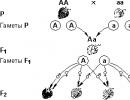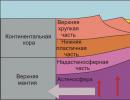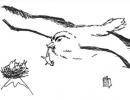Every century is an iron age. Lomonosov or Derzhavin sang their times no worse than Mayakovsky sang his
Two of his lines - “You don’t choose times, / They live and die in them” - went to the people, and this maxim itself seems undeniable. But is it really so impossible to choose your own times? And is it always dangerous for an artist to be at odds with his time? Maybe it is precisely this discord that sometimes shapes a happy creative destiny? Let's discuss the topic with the author of the popular aphorism, poet Alexander Kushner.

Lomonosov or Derzhavin sang their times no worse than Mayakovsky sang his
Every artist, no matter what he creates, in one way or another conducts a dialogue with his time. But even in terrible, tragic times, an artist can have a positive worldview. Mandelstam wrote his most life-affirming lines in 1937. So there is no direct connection between the tragic era and the tragic self-perception of the artist?
Alexander Kushner: The artist’s sense of self may be one way or another, but the direct connection of the works he created with the time in which these works were created is always obvious. We know the Decembrist era not only from historical or archival materials, not only from the correspondence of contemporaries, but also from Pushkin’s poems. And he doesn’t have many poems dedicated to this event, but the color and tone of his poetry in the first half of the twenties differs from the second half of the same decade in greater cheerfulness, the predominance of a major key, because the “Bacchanalian Song” was written before the uprising. And the word “fun” is found more often: “The day of fun, believe me, will come,” “Why did the voice of fun fall silent?” or even such a wonderful line: “Then I’m more lazy when I’m lazy.” And, let’s say, in the poems of the twenty-eighth year, life is painted in different colors: “The vault of heaven is green-pale, boredom, cold and granite.” I undertake to determine almost unmistakably in what century, and sometimes even decade, this or that poetic line was written. “Summer has already opened the gates, / Nature is organizing a common feast...” - it is clear that this is the 18th century and, most likely, its first half. That’s right, this is Lomonosov, 1742. And the lines: “Dear friend, my angel, let us hide there, / Where the gentle waves wash Taurida” - this is, of course, the 19th century, and not only because Taurida already belongs to Russia, but because there is a different syllable, lighter, natural, free, although the verb “let us hide” indicates closeness to the past XVIII century. And in fact, this is Batyushkov, 1815. In the same way we distinguish poems written in the sixties years XIX century: “The bill will be counterfeit, / Will go into light service” (I deliberately take little-known lines from Nekrasov) from lines written at the beginning of the 20th century. "You are the messenger in New Year, / That orchids bring us, / Breathing into an icy cap" (I. Annensky). I give these examples in order to show that the poet does not set himself the task of reflecting his time in poetry, it is reflected, imprinted by itself, thanks to speech changes, transformations, acquisitions of poetic language. As for poetic themes, they can be counted on one hand: love, nature, the city, God, life, its meaning, death, war and peace and a few more, there are not so many. And Note that Lomonosov or Derzhavin glorified their time - the era of enlightenment - no worse than Mayakovsky - his own, revolutionary. But Lermontov did not glorify anything in the same way as Akhmatova or Pasternak later did. And we can say that those I named at the beginning coincided with their time, and the latter only partly, and preferred to look in the other direction.
Have you always been on time?
Alexander Kushner: I think that in this sense I am closer not even to Lermontov, but to, say, Fet, who did not glorify his time at all and did not oppose it, but did not seem to notice it. “As if” is very important, because, of course, I noticed how! But almost demonstratively he chose another, his own, personal, privacy, consciously abandoning the public. “Only in the world is there this pure, / Parting running to the left.” Or “The spruce covered my path with its sleeve.” And this Fetian attitude turned out to be in demand not so much by his era as by the subsequent one, and was useful to the same Pasternak: “What, dear ones, is this a millennium in our yard?” This lyric, addressed not to the multitude, but to each person individually, is extremely close to me. “You are a hostage to eternity, a prisoner of time,” Pasternak said about the poet. And I also feel captive of time, I am in no way freed from it, but in every poem I somehow remember about eternity, that is, about life and death, love and the meaning of life, nature and the city, happiness and unhappiness, etc. . Yuri Trifonov has wonderful story“Eternal Themes” is about how the Soviet editor rejected the author’s story, saying with contempt and indignation: you have some eternal themes there. And then, after some time, the author meets this editor, who left the country, abroad - and he is unhappy, lives lonely and sad, he is overtaken by “eternal themes.” And is it possible to get away from them, no matter where you live? Get away from love, from fate, from loneliness, from old age, illness, unsolvable questions...
I will give here one of my early poems (1965):
But even on the easiest day,
The quietest, most unnoticeable,
Death is like a grain at the bottom,
Shines with a multi-colored sparkle.
In a grove, in a field, in a fresh garden,
Anger horsetail and milkweed,
Acute poison penetrates
Secretly burning my heart.
Like someone behind a bush,
Behind the barn, behind the buffet
Holds a ring over wine
With a monogram and a secret.
How black is his back!
How the sun shines on the ring!
But without this grain
The taste is not the same, the wine is not drinkable.
The vocabulary is modern (“the evil of horsetail and milkweed,” etc.), but the theme is eternal. But it was resolved in its own way, because death is recognized as a condition of life, and without it “one cannot drink wine.” In fact, is it possible to wish for yourself eternal life, because it’s so boring! And in one of the recently written poems it is said: “Immortality must also have a limit - and, probably, this is not bad!” And in general, in poems, with all their dependence and connections with the poetry of your predecessors, there must be something new, something of your own - this is what poetic valor consists of:
...Whether there is no God or whether he exists, we will find out,
Having died, in Gogol, in Kant,
Anyone you meet is over the edge.
We will be satisfied with both options.
I hope these poems are not in danger of being forgotten, and I have more than once had the opportunity to feel that the reader needs them more than poems about the great achievements of the Soviet era.
You have the lines: “I didn’t like the sixties, the seventies, none.” You can understand that no era was particularly favorable to you. Nevertheless, are you satisfied with your poetic destiny?
Alexander Kushner: My poetic fate turned out to be more or less happy, perhaps because I did not enter trampled common territory, and the censorship and literary authorities did not know what to do about it: there was nothing anti-Soviet in the poems, there was nothing to complain about. No, not quite like that: the ideological authorities were offended: the poet does not notice him, he lives his own life. And my first book was subject to severe criticism both in the Leningrad newspaper “Smena” and even in the magazine “Crocodile” - in an article signed “Reviewer”. The poems were declared to be chamber poems, they were accused of petty subject matter, of “buffoonery in art,” and they were predicted to die in the trash heap. And yet, it was 1962, I managed to “slip through”, that is, publish my first book just like my peers, poets and prose writers, in Moscow and Leningrad: Bella Akhmadulina, Andrei Voznesensky, Andrei Bitov, Valery Popov, Vasily Aksenov , Nonna Slepakova and others. I didn't fight Soviet power- I just looked the other way.
Is it possible to wish yourself eternal life, because it’s so boring!
Is being at odds with one's time dangerous for an artist?
The faces of time... Art preserves them and appeals to a person who is able to perceive it.
Alexander Kushner: Of course, under Stalin I would not have fared well. If they had killed me or cut off the oxygen, none of my poems would have seen the light of day. I'm lucky, 1956 turning point year coincided with my youth. Yes, I lived at odds with my time in the sense that party guidelines, Soviet ideology I was not satisfied at all. And I don’t have a single poem on generally accepted topics (the triumph and enduring value of the revolution, the development of virgin lands, great construction projects, a wonderful communist future, etc.). And an intelligent and attentive reader, living the same life as me (he could be a doctor or an engineer or a physicist, a biologist, and I worked for ten years as a literature teacher at a school for working youth), a reader, loving poetry, bought my books (their circulation was fantastic by today’s standards: 10 thousand copies, now in best case scenario 3-4 thousand) and found in them “observations of the mind” and “notices of the heart” consonant with him.
Are you comfortable in the current cultural (and not only cultural) situation?
Alexander Kushner: Of course not. But I don’t strive for comfort; it’s probably impossible, and maybe not necessary. Life is "horrible, terrible, terrible, wonderful, terrible" - this is a line from my poem from the 70s, written almost immediately after "You Can't Choose Your Times." And at the end of this poem the wind bursts into the room: “And the wind behind the curtains whips up bitter foam / And this beautiful, fifth, perhaps part, / Let the fiftieth, nurture and fan.” So, all my life I, too, have been inflating and nurturing this beautiful, perhaps fifth part. And everyone I love in art, be it Vermeer, Van Gogh or Pushkin, Chopin, Pasternak, were doing the same thing.
Do you feel this decade as your own?
Alexander Kushner: I feel all the time I have lived as my own. I don’t divide it into “my” and “not my” decades.
Aren't you offended that from your vast collection poetic texts Only two lines are constantly quoted, and the others seem to not exist? Or, on the contrary, do you perceive this as a sign of the highest recognition: two lines went to the people, became so popular that they have already lost their authorship?
Alexander Kushner: You don’t choose times, you live and die in them" - I was pretty tired of these lines, to tell the truth. They were lucky, because wonderful amateur musicians Sergei and Tatyana Nikitin wrote a song to these words - and the poems were heard. But many are no worse others, for example, “To die is to crack the hardest nut, / Find out all the reasons and motives. / To die is to become a contemporary of everyone, / Except those who are still alive.” Or these: “You will come home, rustling your cloak, / Wiping the rain from your cheeks: / Is life still mysterious? / Still mysterious." Or from the recent ones: "Paradise is the place where Pushkin reads Tolstoy. / This is much more interesting than eternal spring."
“You don’t choose times, you live and die in them” - did you put into these lines a feeling of doom and hopelessness, characteristic only of people deprived of freedom of choice?
Alexander Kushner: There is no need to put a feeling of doom and hopelessness into these verses, because at the end it says: “But the wonderful garden is smoking, / A cloud is shining, I will embrace / My age, my fate, goodbye. / Time is a test. / Don’t envy anyone...” Much depends on yourself, on the eyes with which you look at the world, whether you are able to love a person, rejoice at a jasmine bush, turn to prayer, or poetry, or music in a “difficult moment in life”... And those who thinks that you can choose the time according to your desire and discretion, in my opinion, they are mistaken. Kurbsky fled from Ivan the Terrible, but everyone cannot escape. And is there freedom of choice? It seems to me that this concept is more ecclesiastical, religious, than real, earthly. If freedom of choice really exists (I don’t mean the choice between a handkerchief or a tie, a tram or a bus), then I would like to ask: why do Stalin or Hitler have this freedom, while millions of people are deprived of any choice, doomed to Auschwitz and Kolyma?
I feel all the time I have lived as my own. I don’t divide it into “my” and “not my” decades
Isn’t it possible to choose different times for yourself by changing the country (a possibility that - yes, you’re right - soviet people were mostly deprived, but which turned out to be available to some writers, artists, and directors who lived in the USSR)?
Alexander Kushner: The mystery of our birth defies any logic, any reasonable explanation. This is the case. Were you born in 1936? Lucky you. You, of course, could have died as a child during terrible war(I remember her well), could have lost my parents (my father was on the Leningrad Front), etc. But you didn’t have to endure what Akhmatova wrote in “Requiem” and Shalamov in “Kolyma Tales”. Moreover, even during your youth, some possibility of choice arose, for example, “by changing the country.” And your peers decided independently, at their own peril and risk, what to do, in accordance with their character and circumstances. Brodsky, for example, went through a shameful trial for the authorities and was exiled to the village of Norinskoye. And his poems, with the exception of a few, were not published. Dovlatov’s book, already ready for publication, was cancelled. It is clear that they had every reason to leave, to leave the country. But Evgeny Rein or Vladimir Uflyand, who also could not publish the book, remained. Andrei Bitov, Valery Popov, Yakov Gordin and many other friends of mine remained. And it is hardly possible to say who did the right thing and who did it recklessly. When Brodsky flew to Washington in 1987 (he had just returned from Sweden, where he received Nobel Prize), came to my hotel and we “hug brotherly” after fifteen years of separation, I told him: “You see, I stayed, you left, and you won,” and he replied: “I don’t think so.” There was no affectation in his tone, there was sincerity and sadness. And life was not easy for him all these years, especially in a foreign-language environment (for a poet this is almost unbearable), and he came up with a wonderful saying: “Russia is a country of guns, and America is a country of guns.” It is curious (or strange, or funny - I don’t know which word to choose) that long before all this, as if anticipating future departures, I wrote a poem and it was included in my second book (1966):
Having left, you chose a space,
But time is no worse than him.
Both medications are valid:
Can't remember anything now.
Probably could have stayed -
And there would be one result.
Some steppes are smoking,
Some shadows are flying.
Then you will come to your senses: where are you?
Doesn't matter. Let's say Dzhankoy.
You see: two different years,
But it doesn’t matter which one you drink from.
Many people left in the seventies, including those whose personal circumstances did not force them to do so. I’m just sick of the state lies, Brezhnev’s reports, party congresses, the general feeling of futility Soviet life. And of course, the inability to see the world. By the way, I was not allowed to travel abroad and wrote in poems that lay in my desk for many years about how I was not allowed on the writing trip to Italy that I dreamed of: “My profiles are soiled; somewhere / I said the wrong thing; mine acquaintances are something / Not so pure that it does not catch the eye / of someone; the work / of the Committee is difficult. The tower in ancient Pisa / Without us will fall safely." And in another poem, later, he recalled: “And departure tempted us, like a horse’s move, but indecision saved us - our strength!” No, I wouldn’t leave anywhere, and not only because there are “two different Letas, but it doesn’t matter which one you drink from,” but first of all because my favorite poets: Mandelstam, Akhmatova, Pasternak did not leave, they remained in Russia in a much more terrible, disastrous time. And also because I couldn’t leave my parents and never see them again. And when they ask me why Brodsky did not come to St. Petersburg during the perestroika years, since he even visited Finland, I think I know the answer: he could not have crossed the threshold of the apartment in which he left his parents, who suffered and died alone.
To what extent does an artist reflect his era, and to what extent does he shape it with his creativity?
Alexander Kushner: As it reflects, I have already said. How it forms is difficult to answer. Well, of course, the figures of socialist realism, called upon by the party to educate their contemporaries with their creativity, tried very hard and showed a lot of ingenuity in this matter. But what remains of their books? Almost all of them failed along with the communist ideology. And even Mayakovsky, “mobilized and called up by the revolution,” educated his reader not out of duty, but at the behest of his heart (“And if you don’t want to be a sycophant, don’t shut your mouth when you see the disgrace, don’t pass by...”, etc. .p.), today he no longer speaks to us “out loud”. And how he dreamed of appearing “in the Tse Ka Ka of the coming bright years” with all the hundred volumes of his “party books”! Pasternak was right when he compared his poetic heritage to a huge empty train, in which only one car is loaded with genuine wonderful poetry. So, he shaped his era - and what came of it? I think that a poet does not shape anything, does not educate anyone, just as he does not educate a tree, or a cloud, or a mountain slope. Art, like nature, does not set itself an educational task. It pleases, delights, consoles, suggests a new thought, helps to cope with trouble, addresses not the audience, but the person who is able to perceive it, entering into a personal relationship with him.
We all have complaints about our age, it cannot be otherwise
Our conversation about times, about poetry and time, also relates to age, since age is calculated by years lived. And we are talking right after your eightieth birthday. How did you feel when you celebrated your anniversary?
Alexander Kushner: Of course, my age fills me with “fear and trembling.” But at the same time, I understand that it’s a sin to complain, you can’t be discouraged. As Pasternak said in his address to winter and the God behind it, “You give more than they ask.” We all have complaints about our time, our century, it cannot be otherwise, but we must admit: before our eyes, the duration of human life has increased. Forty-year-old Baratynsky was called a “gray-haired old man” by his young, wise-cracking friends. And today forty years is a young age. Recently they showed on television an 88-year-old man, a former parachutist, who decided to shake off the old days - and jumped with a parachute and landed perfectly. And I was happy for him and thought that I, in my own way, do the same thing, sitting at my desk. When you start writing a poem, you never know how it will end: failure or success. How can one not be grateful to fate for the fact that poems are being written - and they are no worse than before, or even better! Poets did not live to be eighty. We can remember very few, for example Goethe. And among the Russians - 86-year-old Vyazemsky. And what’s remarkable is that in his old age he wrote his best poems, thanks to which he will forever remain in Russian poetry. These poems are mournful, gloomy ("The one you knew / That Vyazemsky is no longer...", "I only expect death from death", "All my peers have long been retired...", etc.), but I need them, they also help me cope with age. And their sorrowful sound turns out to be healing for me. This year in the magazine " New world"My poem was published, for which I chose as the epigraph the line “We are all fellow travelers to Rostov” - from Vyazemsky’s later poems. Here it is:
The flickering of groves and bushes,
Dull days and dark dreams,
It's most difficult at dawn.
I'm not ready to get out of bed
Get caught in the same networks again
Hateful deeds and pathetic words.
Alas, in old age we are responsible
For your sad catch.
Now one of all verses
I keep this line in mind:
"We are all fellow travelers to Rostov."
Vyazemsky will meet us in Rostov.
It is unlikely that such a poem could have appeared in a magazine in the sixties. And Tvardovsky, even if he wanted to, could not publish it. But today, thank God, it is possible. And for this, too, we must say thank you. (By the way, I was first published in Novy Mir half a century ago - in 1966!). Maybe I'm wrong, but it seems to me that in these verses, despite all the sadness, there is a glimmer of joy and consolation.
Business card
Alexander Kushner is a Russian poet. Born in 1936 in Leningrad. Studied at the philological faculty of Leningrad pedagogical institute them. Herzen. Member of the Russian PEN Center (1987). Chief Editor"Poet's Libraries" (since 1992; since 1995 - " New Library poet"). Member of the editorial boards of the magazines "Zvezda", "Counterpoint", the virtual magazine "Art-Petersburg". Laureate of the State Prize of the Russian Federation, the "Poet" Prize and several others. His friend Joseph Brodsky gave an expressive description of Kushner: "Alexander Kushner is one one of the best poets of the twentieth century, and his name is destined to stand among the names dear to my heart anyone whose native language Russian".
You don’t choose times, / They live and die in them
The first line of an untitled poem (1976) by the Soviet poet Alexander Semenovich Kushner (b. 1936):
You don't choose times
They live and die in them,
More vulgarity in the world
No, than beg and blame.
As if you can use these
As in the market, change.
Every century is an iron age.
But the wonderful garden is smoking,
- - 1982, 101 min., color, 2 volumes. genre: film story. dir. Viktor Sokolov, screenplay Vadim Trunin, opera. Vadim Grammatikov, Nikolay Pokoptsev, art. Alexey Fedotov, comp. Evgeny Krylatov, sound. Galina Golubeva...
Lenfilm. Annotated Film Catalog (1918-2003)
- - Wed. No! what is in the depths of the soul, The grave will not take it away: It will remain for me. D.V. Venevitinov. Comfort. Wed. Traces of generations will disappear, But talent lives, genius is immortal. F. Glinka...
- - Wed. Yes, is it possible to vouch for this in advance, Which of us here will outlive whom. Krylov. An old man and three young...
Mikhelson Explanatory and Phraseological Dictionary
- - Wed. The deceased was a venerable chamberlain, with a key, and he knew how to deliver the key to his son; Rich, and married to a rich woman; Married children, grandchildren...
Mikhelson Explanatory and Phraseological Dictionary
- - The first line of an untitled poem by the Soviet poet Alexander Semenovich Kushner: You don’t choose times, They live and die in them, There is no greater vulgarity in the world than to beg and blame...
- - The title of the play by Spanish playwright Alejandro Casona. Allegorically: about decent behavior in difficult circumstances...
Dictionary winged words and expressions
- - From Latin: De duobus malis minus est semper eligendum. From the work “Nicomachean Ethics” by the ancient Greek philosopher Aristotle: “We must choose the lesser of evils”...
Dictionary of popular words and expressions
- - From the song “Bacchic Delirium” by the French poet and playwright Marc Lntuan Desaugiers. Allegorically: about a serious attitude towards life and death...
Dictionary of popular words and expressions
- - The good die, but their deeds live. Wed. No! what is in the depths of my soul, The grave will not take it away: It will remain for me. D. V. Venevitinov. Consolation. Wed. Traces will disappear over generations, But the talent lives, the genius immortal...
- “They don’t die when they grow old, but they grow old and live.” Wed. Yes, you can vouch for that in advance, Which of us here will outlive whom. Krylov. An old man and three young...
Michelson Explanatory and Phraseological Dictionary (orig. orf.)
- - What kind of aces live and die in Moscow? Wed. The deceased was a respectable chamberlain, with a key, and he knew how to deliver the key to his son; He was rich and was married to a rich woman; Married children, grandchildren...
Michelson Explanatory and Phraseological Dictionary (orig. orf.)
- - Cm....
- - The good die, but their deeds live...
IN AND. Dahl. Proverbs of the Russian people
- - People also live on the water. See DECENTITY - DECITY -...
IN AND. Dahl. Proverbs of the Russian people
- - See LIFE -...
IN AND. Dahl. Proverbs of the Russian people
- - Air. Joking. About an orderly who usually sleeps standing up. GEST-1, 233. /i> A playful reminiscence of the title of Kason Alejandro’s play “” ...
Big dictionary Russian sayings
“You don’t choose times, / They live and die in them” in books
Times don't choose...
From the book Articles and Memoirs author Schwartz Evgeniy LvovichYou don’t choose times... B modern articles Schwartz is often called a “kind storyteller,” and his plays “The Naked King,” “The Shadow,” “Cinderella” and “Dragon” are called “sweet and humane.” Into the current vision Soviet history and literature, I would like to bring some clarity.C
"People live and die..."
From the book I Killed Stepan Bandera author Sushko Yuri Mikhailovich“People live and die...” “Well, that’s all,” ex-resident Sergei thought sadly, looking blankly out the window of a military transport plane flying from Berlin to Moscow. – Farewell, Germany, now forever... Thank you, comrade “Krylov”, bow to you
Times don't choose
From the book Yangel: Lessons and Legacy author Andreev Lev VyacheslavovichTimes do not choose Flipping through the pages of the “Collection of Memories of Mikhail Kuzmich Yangel”, written in 1981–1991 by employees of the Yuzhnoye design bureau and “Baikonur - a miracle of the twentieth century. Memories of Baikonur veterans about academician Mikhail Kuzmich Yangel and
"People live and die..."
From the book Yuri Mikhailovich Sushko I killed Stepan Bandera author Sushko Yuri Mikhailovich“People live and die...” “Well, that’s all,” ex-resident Sergei thought sadly, looking blankly out the window of a military transport plane flying from Berlin to Moscow. - Goodbye, Germany, now forever... Thank you, comrade “Krylov”, bow to you
Times don't choose
From the book Pedagogical Decameron author Yamburg EvgeniyTimes don’t choose Idealiast crucian carp They fluttered in a cheerful flock into the school principal’s office: sixth-graders, in whose burning eyes one could read the intention to prove that they were right at all costs. “We decided to raise decorative rats at school, they are like that.”
HOW STARS ARE BORN, LIVE AND DIE
From the book Secrets of the Universe author Demin Valery NikitichHOW STARS ARE BORN, LIVE AND DIE If you suddenly ask yourself the question: which celestial objects are most suitable for the role of a symbol of the Universe, then, most likely, the stars will come to mind first. It is them, in the words of Aeschylus, “the lords of the radiant sky,” without saying a word, who will certainly be called
Chapter 1 You can't choose times
From the book Afghan War of the GRU. The secrecy has been lifted! author Tobolyak GennadyChapter 1 Times do not choose Anger, sad anger Seething in the chest. A. Blok At the beginning of March 1981, I was in the second Afghan capital, Kandahar, and led the work of the reconnaissance group to combat the Basmachi. The situation in Kandahar was explosive, the Basmachi were pressing, not
“You don’t choose times - they live and die in them...”
From the book Legends of the Moscow feast. Notes on tasty, not so tasty, healthy and not so healthy, but still amazing interesting life }





